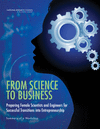Library Item
From Science to Business: Preparing Female Scientists and Engineers for Successful Transitions into Entrepreneurship: Summary of a Workshop
Description:
Scientists, engineers, and medical professionals play a vital role in building the 21st- century science and technology enterprises that will create solutions and jobs critical to solving the large, complex, and interdisciplinary problems faced by society: problems in energy, sustainability, the environment, water, food, disease, and healthcare. As a growing percentage of the scientific and technological workforce, women need to participate fully not just in finding solutions to technical problems, but also in building the organizations responsible for the job creation that will bring these solutions to market and to bear on pressing issues. To accomplish this, it is important that more women in science and engineering become entrepreneurs in order to start new companies; create business units inside established organizations, mature companies, and the government; and/or function as social entrepreneurs focused on societal issues. Entrepreneurship represents a vital source of change in all facets of society, empowering individuals to seek opportunity where others see insurmountable problems.
From Science to Business: Preparing Female Scientists and Engineers for Successful Transitions into Entrepreneurship is the summary of an August 2009 workshop that assesses the current status of women undertaking entrepreneurial activity in technical fields, to better understand the nature of the barriers they encounter, and to identify what it takes for women scientists and engineers to succeed as entrepreneurs. This report focuses on women’s career transitions from academic science and engineering to entrepreneurship, with a goal of identifying knowledge gaps in women’s skills as well as experiences crucial to future success in business and critical for achieving leadership positions in entrepreneurial organizations.
From Science to Business makes the case that in addition to educating women scientists and engineers in rigorous problem solving, it is equally important to provide exposure and training to impart the skills that will enable more women to move from the role of expert to that of leader in dynamic new business enterprises. This book will be of interest to professionals in both academia and industry, graduate and post-graduate students, and organizations that advocate for a stronger economy.






